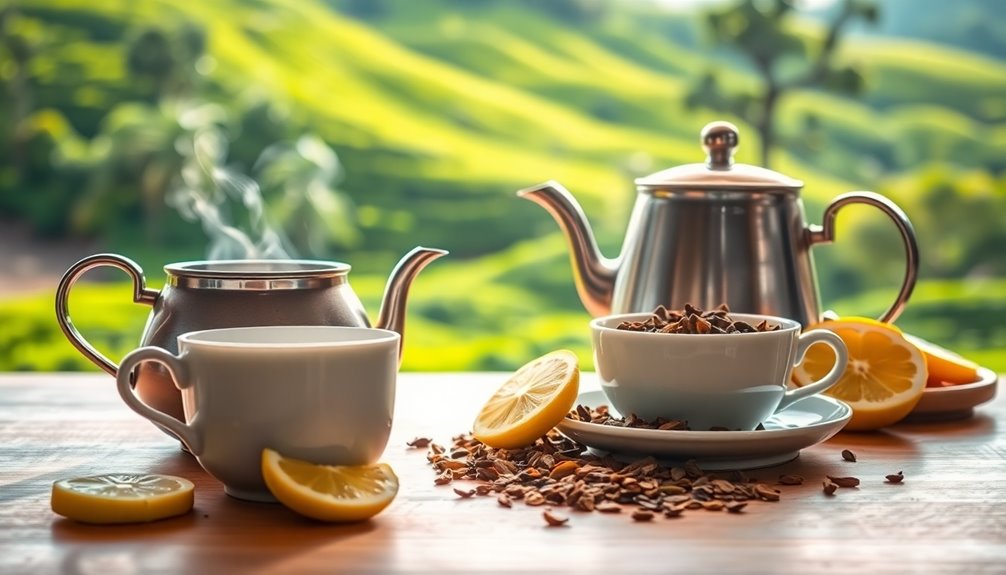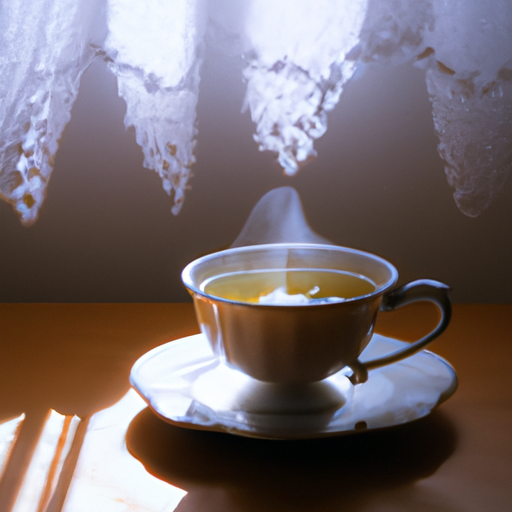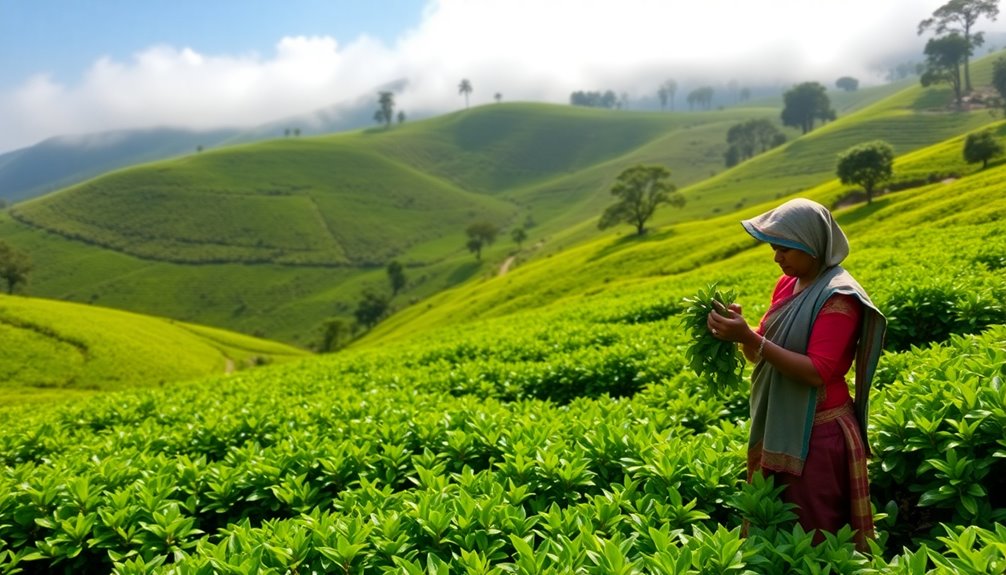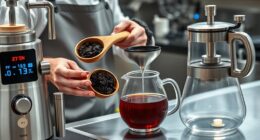Brewing authentic Ceylon tea at home is a fun and tasty adventure! Start with fresh, filtered water and use about 2.5g of tea leaves for every 220ml of water. Boil the water, let it cool a bit, then pour it over your tea leaves. Steep your Ceylon black tea for 3-5 minutes to get the perfect flavor—adjust it for your taste! Remember to look for "100% pure Ceylon tea" for the best experience. Enjoy the bold, rich flavors and a sip of Sri Lankan tradition! Keep exploring, and you'll uncover even more delightful tips!
Key Takeaways
- Use fresh, filtered water to enhance the flavor of your Ceylon tea.
- Measure 2.5g of tea leaves for every 220ml of water for optimal brewing.
- Boil the water, then let it cool slightly before steeping the tea leaves.
- Steep the tea for 3-5 minutes, adjusting the time based on your taste preferences.
- Look for "100% pure Ceylon tea" to ensure authenticity and quality in your brew.
Introduction
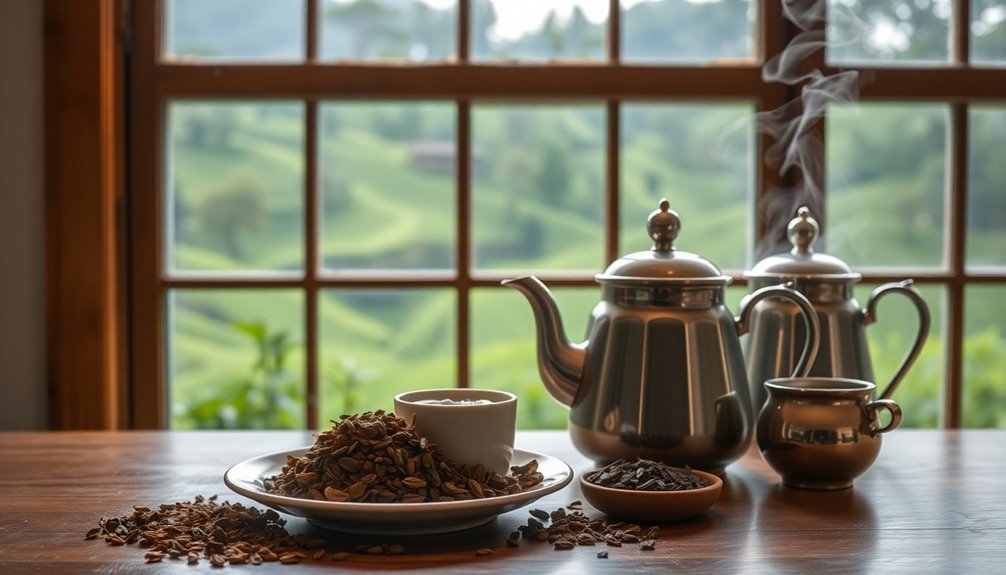
Ceylon tea, known for its vibrant flavor and aroma, is a delightful beverage that you can easily brew at home.
Imagine sitting down with a warm cup of Ceylon black tea, the citrusy scent filling the air! To create that perfect cup of Ceylon, you'll need to start with fresh, filtered water. This step is essential because the quality of water affects the taste.
Here's how to brew your tea:
- Measure 2.5g of tea leaves for every 220ml of water.
- Bring your fresh water to a boil, and then let it cool slightly before pouring it over the tea leaves.
- Steep your Ceylon black tea for about 3-5 minutes. This timing is key; steeping too long can make your tea bitter.
Ceylon's Rich Tea Heritage
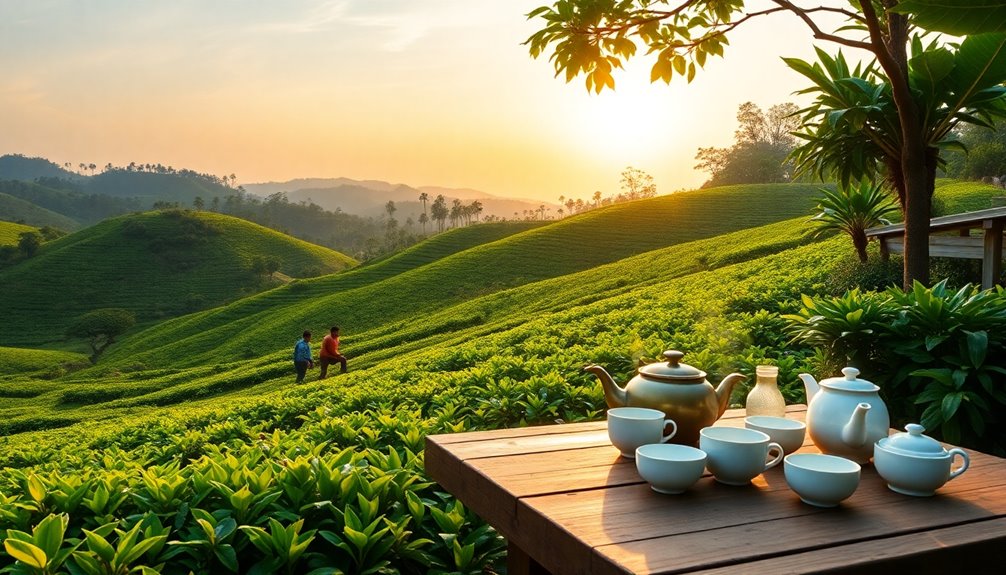
When you sip a cup of Ceylon tea, you're not just enjoying a beverage; you're experiencing centuries of tradition and craftsmanship. This delightful drink hails from Sri Lanka, where tea cultivation began in the 19th century. The British introduced it, and now, Ceylon tea is a proud part of the country's rich tea heritage.
The unique climate of Sri Lanka's central highlands, with high humidity and plenty of rain, creates the perfect environment for growing the Camellia sinensis plant. This plant is the heart of Ceylon tea, giving it a strong flavor and a refreshing, citrusy aroma that many love.
When you brew a cup, you're not only tasting a drink but also savoring history.
Here are some fun facts about Ceylon tea:
- It's a major player in the global tea market, making Sri Lanka an important tea exporter.
- Ceylon tea's bold taste makes it a favorite in blends like Earl Grey and English breakfast tea.
- Each cup brings a piece of Sri Lanka's vibrant culture to your home.
Tea Varieties by Region
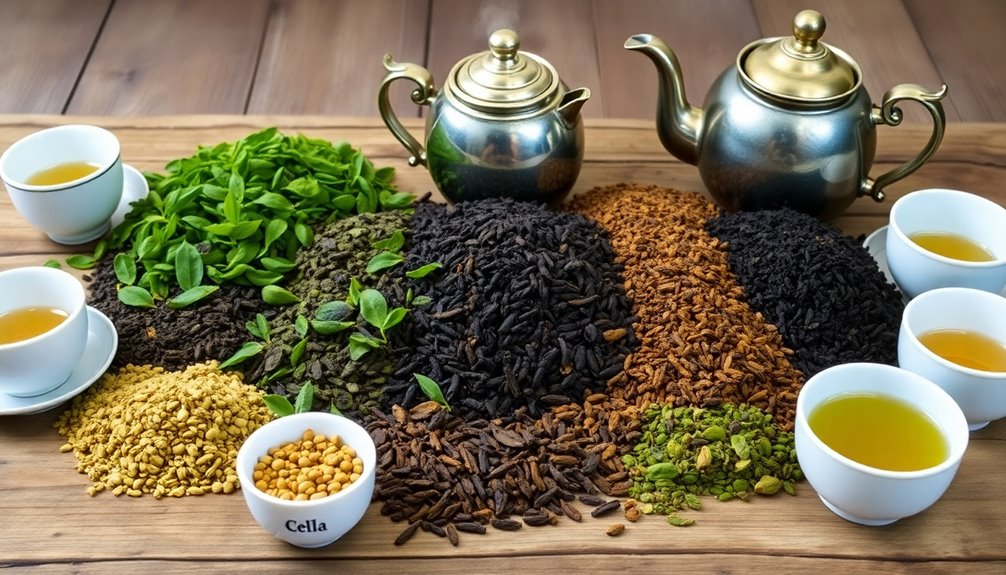
Across Sri Lanka, various regions produce distinct types of tea, each reflecting the unique characteristics of its environment. When you explore Ceylon tea, you'll find delightful varieties from Nuwara Eliya, Uva, Kandy, and Dimbulla.
- Nuwara Eliya: This region's high altitude gives you light, fragrant teas with fruity and floral notes. They're perfect for a delicate afternoon tea!
- Uva: If you enjoy a bold flavor, Uva teas are for you. They come with a slightly astringent finish that's great for a strong Ceylon black tea.
- Kandy: Known for robust brews, Kandy teas offer a full-bodied flavor. They're a fantastic choice for traditional tea lovers and blends.
- Dimbulla: With its rich aroma, Dimbulla teas provide a smooth, well-rounded taste. You might notice sweet and slightly spicy notes that make every sip special!
Each tea variety has its own unique tea taste, so don't hesitate to try them all.
You'll discover a world of flavors that can brighten up any gathering with family and friends. Happy brewing!
Ceylon's Diverse Terroir Influences Flavor
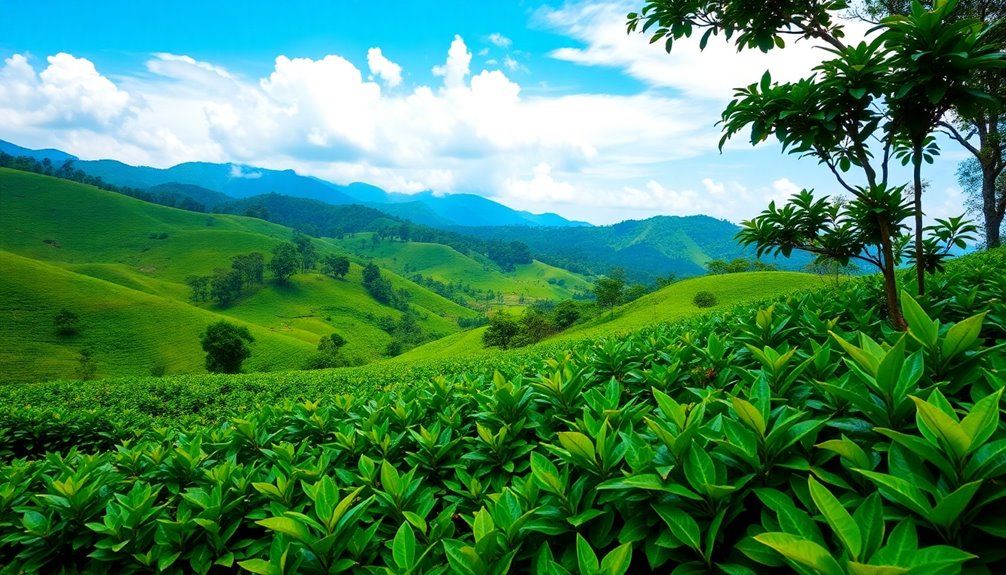
The unique terroir of Sri Lanka plays a significant role in shaping the flavor profiles of its famous teas. When you sip Ceylon tea, you're tasting a blend of nature's wonders!
The high altitudes, humidity, and rainfall in the central highlands create a magical environment for tea leaves to thrive. Each region, like Nuwara Eliya, Uva, and Dimbula, brings its own special twist to the flavor profile, giving you everything from bright and floral notes to bold and robust tastes.
The soil composition and climate variations add unique characteristics to Ceylon tea, resulting in that delightful citrusy aroma and sweet, juicy flavors.
Plus, the way the tea is processed—thanks to local traditions—can change the taste and quality, making each cup a little adventure!
Seasonal changes, like monsoon rains and dry spells, also play a part in how the tea develops its flavors over time.
Sourcing Authentic Ceylon Tea
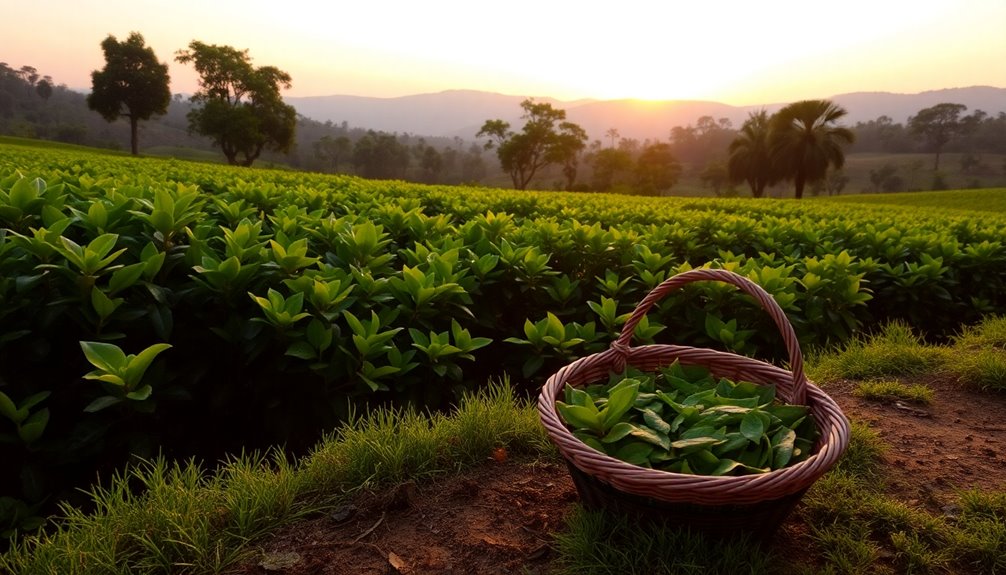
Finding authentic Ceylon tea is essential for experiencing its true flavor and aroma. You want to make sure you're getting the best, and that starts with sourcing. Look for brands that proudly display "100% pure Ceylon tea" on their packaging. This label guarantees quality and authenticity, ensuring your tea comes directly from Sri Lanka.
Explore renowned tea estates like Nuwara Eliya, Uva, and Dimbulla. Each of these areas produces high-quality Ceylon tea, offering unique flavor notes that can delight your taste buds. It's like a little adventure in every cup!
When you're ready to buy, head to specialty tea shops that focus on direct trade with Sri Lankan growers. This way, you're not just getting tea; you're supporting the farmers who lovingly cultivate these leaves.
To make it easier for you, here's a quick checklist:
- Look for "100% pure Ceylon tea."
- Choose reputable brands.
- Visit specialty tea shops.
- Explore different tea estates.
Practical Applications
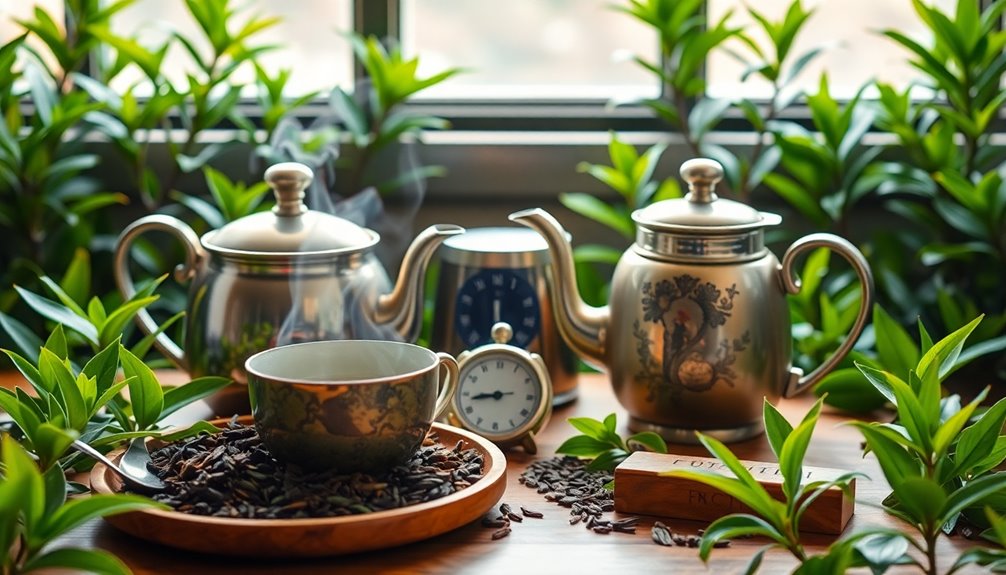
Brewing authentic Ceylon tea at home can transform your tea experience into a delightful ritual. To get started, boil filtered water to a hot temperature of 95˚C-100˚C. This ensures you extract the best flavors from your loose tea!
Use about 2.5g of Ceylon tea for every 220ml of water, but feel free to adjust this to your taste. Before adding your tea, preheat your teapot and cups by swirling some hot water around; this keeps everything warm and enhances flavor.
Next, it's time to brew! Cover your teapot and steep the black Ceylon tea for about 3-5 minutes. This helps avoid any bitterness and ensures a perfect cup.
If you're in the mood for something refreshing, try cold brewing! Just mix loose tea with cool filtered water and let it sit in the fridge for at least 12 hours.
Once your tea is ready, store any leftover loose tea in an airtight container to keep it fresh. Enjoy this joyful tea-making process with family and friends, making each cup a special moment to share together!
Frequently Asked Questions
How to Make Pure Ceylon Tea?
To make pure Ceylon tea, you'll need high-quality loose leaves and freshly boiled water. Steep the leaves for 3 to 5 minutes, then strain. Enjoy it plain or with a hint of milk or sweetener.
How Long Should I Steep Ceylon Tea?
You should steep Ceylon tea for about 3 to 5 minutes. Steeping less than 3 minutes makes it weak, while over 5 minutes can make it bitter, so aim for that sweet spot for the best flavor.
Is Ceylon Tea Better With Milk or Lemon?
Ceylon tea's best with either milk or lemon, depending on your taste. If you love creaminess, go for warm milk. For a refreshing zing, add lemon. Try both to discover your favorite flavor!
What Is the Best Grade of Ceylon Tea?
When choosing the best grade of Ceylon tea, you'll want to consider high-grown varieties like Silver Tips or Golden Tips. They offer delicate flavors and sweetness that connoisseurs often appreciate for their unique qualities.
Conclusion
Now that you know how to brew authentic Ceylon tea at home, it's time to enjoy this delightful drink with your family! Gather everyone around, share stories, and sip on that warm, flavorful tea together. Remember, every cup is a little taste of Ceylon's beautiful land. So, whether it's a sunny afternoon or a cozy evening, let this tea bring joy and connection to your home. Cheers to your new tea adventure!

